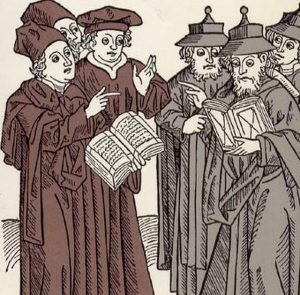Combating Christian Pressures
Common to Jewish argumentation in all sectors of Europe was a focus on the Hebrew Bible, with identification of major Christian arguments grounded in biblical verses and repudiation of these Christian arguments. There were a number of broad Jewish methodological positions that undermined in general ways Christian readings of Scripture. They included insistence that Christian views were misled by erroneous translation of the Hebrew text and that Christian exegesis was regularly decontextualized, obscuring the simple and straightforward meaning of the biblical text. Beyond these broad stances, Jewish polemicists challenged the particulars of Christian readings on hundreds of verses. These challenges are sometimes found in the general commentaries of such luminaries as David Kimhi; sometimes entire works of polemically-oriented biblical commentary were composed.
While Christian missionizing argumentation and Jewish rebuttal was grounded in divergent understandings of the Hebrew Bible, both extended into other arenas as well. With the growing place of philosophic thinking within both communities, Christians advanced arguments for the philosophic truth of Christianity, while Jews vigorously denounced such key Christian doctrines as Incarnation and Trinity as obviously irrational. Another basis of disagreement involved the moral stances of the two communities. Christians pointed to heavy Jewish involvement in money-lending as evidence of lower moral standards; Jews attacked many facets of Christian behavior, focusing heavily on the bellicosity of medieval Christian society and what Jews perceived as sexual licentiousness.
The most uncomfortable Christian attacks were those that focused on the disparity in material circumstances of the two faith communities. Jewish polemical works regularly portray Christian thrusts drawn from the successes of the Christian world and the debased circumstances of the Jews. This disparity is taken to reflect divine favor of the Christian camp and divine abandonment of the Jews. Hearing Christians advance this line of polemical argumentation was difficult for medieval Jews, but their leaders pondered the issue deeply and provided lines of response. Jews argued that Christian successes did not meet the criteria of messianic redemption, suggesting that Jesus was in fact not the promised Messiah. More important, they denied that Jewish suffering was a sign of abandonment by God; they claimed, rather, that the tribulations suffered by the Jews were a divinely imposed test. Steadfastness in the face of a divinely imposed test had won rich promises by God to the patriarch Abraham; subsequent Jewish steadfastness would win similar rewards for his descendants.
Images
Primary Texts
Seconday Literature
- H. Trautner-Kromann, Shield and Sword- Jewish Polemics against Christianity and Christians in France and Spain from 1100-1500 (Tubingen- J. C. B. Mohr, 1993).
- R. Chazan, Fashioning Jewish Identity in Medieval Western Christendom (Cambridge- Cambridge University Press, 2004).
- D. Lasker, Jewish Philosophical Polemics against Christianity in the Middle Ages (2nd ed.; Oxford- The Littman Library of Jewish Civilization, 2007).
- O. Limor and G. Stroumsa (eds), Contra Iudaeos- Ancient and Medieval Polemics between Christians and Jew (Tübingen- J. C. B. Mohr, 1996).
- J. Cohen, “Towards a Functional Classification of Jewish Anti-Christian Polemic in the High Middle Ages,” in Religionsgespräche im Mittelalter, ed B. Lewis and F. Niewohner (Wiesbaden, Oto Harrassowitz, 1992), 93-114.
- J. Cohen, “Profiat Duran’s ‘The Reproach of the Gentiles’ and the Development of Jewish Anti-Christian Polemic,” in Shlomo Simonsohn Jubilee Volume, ed. D. Carpi et al, (Tel Aviv- Tel Aviv University, 1993) 71-84.
- D. Berger,”Christian Heresy and Jewish Polemic in the Twelfth and Thirteenth Centuries.” Harvard Theological Review 68 (1975)- 287-303.
- D. Berger, “On the Uses of History in Medieval Jewish Polemic against Christianity- The Search for the Historical Jesus,” in Jewish History and Jewish Memory- Essays in Honor of Yosef Hayim Yerushalmi, ed. E. Carlebach et al., (Hanover- Brandeis University Press, 1998), 25-39.
Videos
What do you want to know?
Ask our AI widget and get answers from this website
